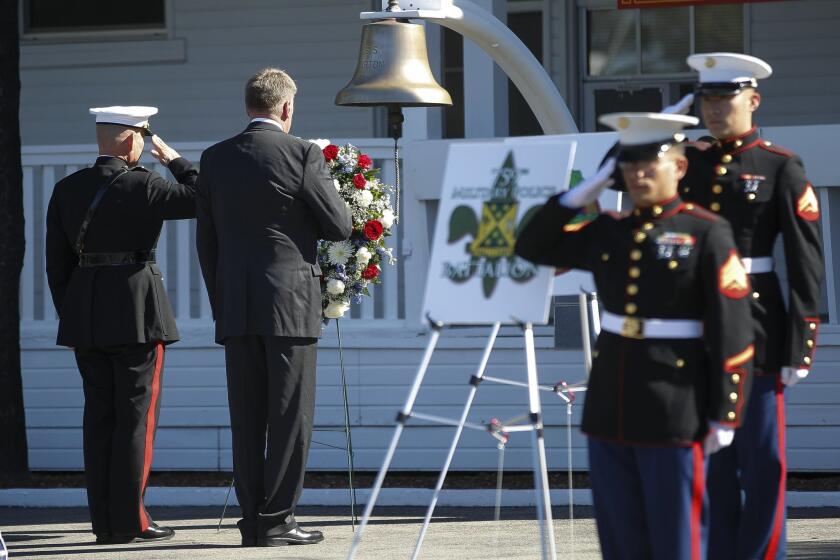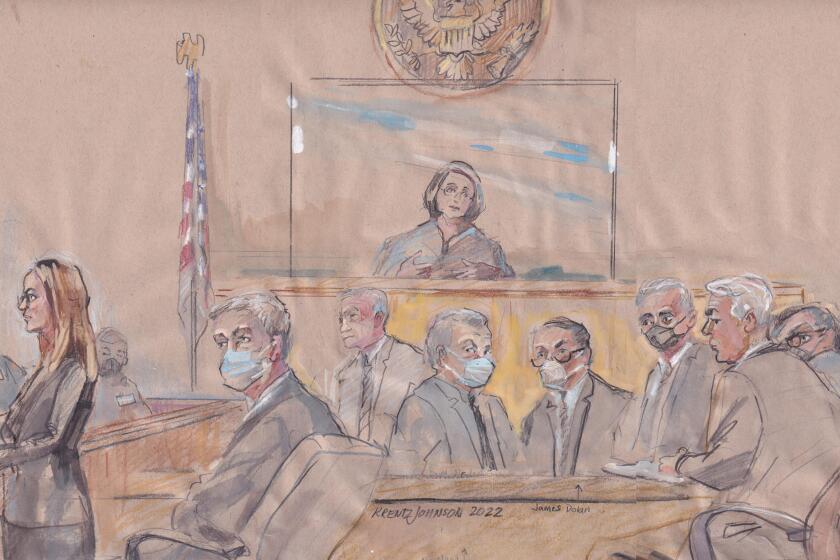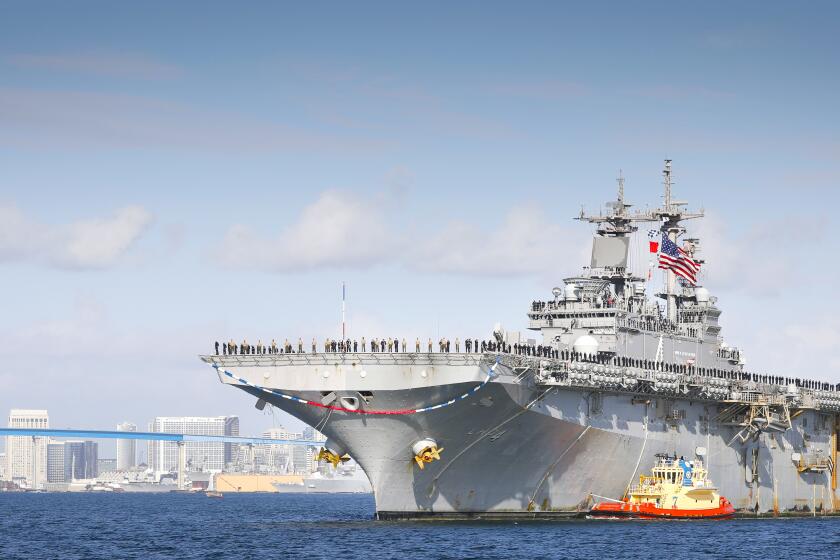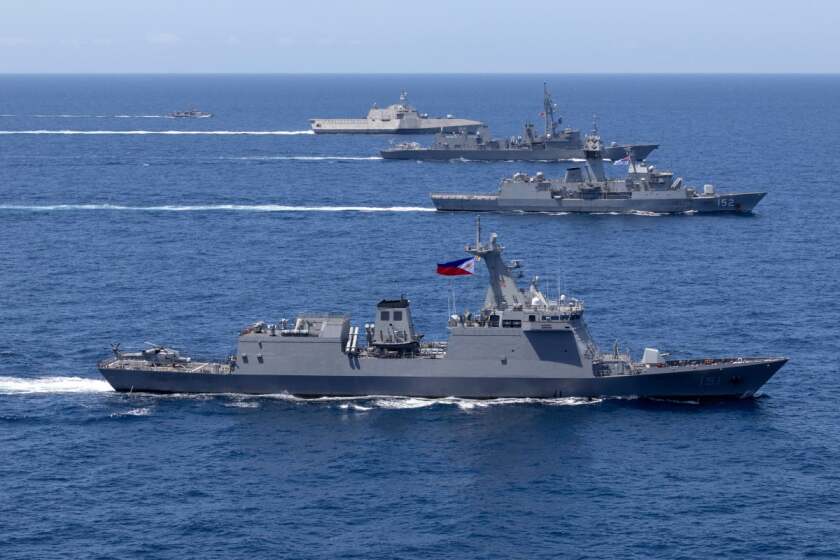No Medal of Honor for Peralta
A years-long battle to upgrade the posthumous combat award for Sgt. Rafael Peralta to the Medal of Honor appeared to end in defeat Friday, when the Pentagon announced it will not reopen the nomination for the fallen Marine.
The 25-year-old San Diegan was awarded a Navy Cross, the nation’s second highest medal for valor in combat, after he smothered a grenade blast during house-to-house fighting in Fallujah, Iraq in November 2004.
Supporters in Peralta’s hometown, on Capitol Hill and in the Navy have persistently campaigned for the top award, including Rep. Duncan Hunter, R-Alpine, a Marine combat veteran who submitted additional evidence in support of a Medal of Honor.
The entire California congressional delegation pushed to reopen the nomination, which seems unlikely now that a third defense secretary has declined to upgrade Peralta’s medal.
“Secretary (Chuck) Hagel and the department remain forever grateful to Sgt. Peralta for his selfless service to our nation,” the Pentagon said in a news release.
But an “exhaustive” review of the evidence by Hagel — as well as the armed forces medical examiner, the Defense Department general counsel, the acting undersecretary for personnel and readiness, and several high-ranking military officers — concluded that the totality of evidence in Peralta’s case did not meet the “proof beyond a reasonable doubt” standard for the Medal of Honor, defense officials said.
“The Department of Defense has taken extraordinary measures to ensure Sgt. Peralta’s nomination received full consideration. Three separate secretaries of defense have now examined the case, and each independently concluded the evidence does not support award of the Medal of Honor.”
The decision not to reopen the Medal of Honor nomination “does not detract at all from how (Peralta) served the nation with great honor and distinction,” and it does not cast doubt on his Navy Cross, said Navy Lt. Cmdr. Nathan Christensen, a Defense Department spokesman.
Unfair standard?
The Navy Cross citation issued in 2008 said that “without hesitation and with complete disregard for his own personal safety, Sgt. Peralta reached out and pulled the grenade to his body.”
Peralta’s family has refused to accept the Navy Cross medal.
The Navy and Marine Corps had recommended Peralta, an immigrant from Tijuana, for the top award based on seven eyewitnesses who said he scooped the grenade under his body to save nearby Marines.
But a special panel of experts convened by then-Defense Secretary Robert Gates to vet discrepancies in eyewitness and forensic evidence concluded that Peralta was probably killed instantly by a bullet wound to the head, making it unlikely that he consciously grabbed the grenade.
All five panel members — two forensic pathologists, a neurosurgeon, a Medal of Honor recipient and a retired Army general — said they were “convinced that the evidence does not support the Medal of Honor.”
Others felt Peralta was held to a tougher standard of proof than the traditional requirement of two eyewitness statements.
Douglas Sterner, an Army veteran of the Vietnam War and curator of the Military Times Hall of Valor, said Peralta is a victim of Pentagon stubbornness.
“The Medal of Honor is recommended by the comrades in arms that witness the action. It has to go through a vetting process, but the individuals who witness the action should be the basis on which that medal is awarded,” said Sterner, who began building a database of top military honors in 1998.
“I have never heard ‘beyond a reasonable doubt’ used in the same sentence as Medal of Honor before,” Sterner added. “It’s a legal term, not a military term.”
He gave an example: “In World War II, a Navy sailor was shot, mortally wounded and in his dying gasps, steered his ship out of the way of a torpedo and was awarded the Medal of Honor. By today’s standards, they would take that Medal of Honor away and say ‘Well, did he steer it out or did he fall dead and steer it out of the way without making that conscious action?’”
To buttress the forensic evidence, Hunter the Congressman gathered video of Peralta’s body that showed blast wounds after the grenade attack, a pathology report, photos and other items. He submitted the material to the Defense Department for reconsideration of Peralta’s case.
In December 2012, then-Defense Secretary Leon Panetta decided that he, too, had doubts because of Peralta’s head wound and questions about where the grenade exploded.
Supporters then hoped that Hagel, who received the Purple Heart as an infantryman in Vietnam, might see things differently.
In March of last year, the 10th anniversary of the U.S.-led invasion of Iraq, Hunter introduced a bipartisan, joint House-Senate resolution recommending the top combat-valor honor for Peralta.
Sen. Dianne Feinstein, D-Calif., said in a statement introducing the Senate version: “I do not take the awarding of the Medal of Honor lightly. Indeed, the Medal of Honor is our country’s highest and most prestigious military award.”
She added: “It says something to me that seven eyewitnesses verified that Sgt. Peralta absorbed the blast of the grenade and saved the lives of his fellow Marines,” and that the Navy Cross citation backed up their accounts and gave a recommendation for Medal of Honor, as did local commanders, the Marine commandant, the Navy secretary and the chairman of the Joint Chiefs of Staff.
Enduring legacy
On Friday, Hunter said the seed of doubt cast by a pathologist regarding Peralta’s mortal head wound is likely insurmountable, despite an abundance of forensic and eyewitness evidence supporting the higher award.
“I continue to believe that Sgt. Peralta deserves the Medal of Honor for what he did. But in the end, it’s not my call. It’s the secretary’s call, and I trust he did the very best job he could do with all the information that he had,” Hunter said.
The Congressman and Peralta’s family take comfort in the Navy destroyer named for Rafael Peralta that’s being built now.
His namessake warship and the Navy Cross medal, “Those are things that can never be taken away from him. His legacy will continue to endure,” Hunter said.
George Sabga of San Diego, a spokesman for the Peralta family, said they are extremely proud of the late Marine and all who fought for him to receive the Medal of Honor, including the Marines who survived Fallujah.
“Those Marines, they are our heroes. They bore witness. We believe them,” Sabga said. “However, we respect the decision of Secretary Hagel and the Department of Defense.”
The Peraltas have not decided whether to finally accept the Navy Cross.
“We have the ship to look forward to,” Sabga said. “To have a world-class destroyer named after him, homeported in his home city, it’s an honor for us. That ship is going to come alive. It’s him. Think of all the sailors who are going to serve on her and wear his name on their hat and their shoulder. The Medal of Honor is fine, but the ship is something that will carry on his name for 30 years at least.”
He added: “It’s very hard to get the Marines who were (with Peralta) to appreciate that, but it will sink in when they actually see her” sailing someday in San Diego Bay.
Get Essential San Diego, weekday mornings
Get top headlines from the Union-Tribune in your inbox weekday mornings, including top news, local, sports, business, entertainment and opinion.
You may occasionally receive promotional content from the San Diego Union-Tribune.




